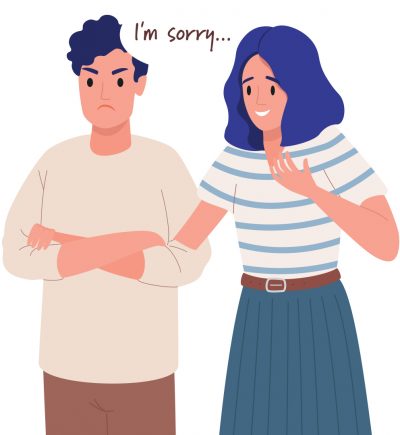“Sorry seems to be the hardest word…” Many of us have listened to Elton John singing this evergreen love song as we were growing up and learning the pain of unspoken regrets. But is there any truth to this phrase, and why?
Any married couple knows that marriage is not a bed of roses. After all, ‘there is no rose without thorns’. Mistakes will happen and can lead to bigger problems if they are left to fester. Sometimes, all it takes to remedy this is for one spouse to own up to a mistake and say sorry.
Why does conflict arise?

Be aware of possible causes that may lead to conflicts in marriage, such as:
- Personality differences: Many factors determine our personality, such as gender, upbringing, education and beliefs. A couple with different personalities can complement each other, but a clash of personalities may lead to conflicts.
- Lack of time: Being occupied with work or kids may cause couples to spend less quality time with each other. This leads to a lack of romance and intimacy, which are important to sustain a good relationship.
- Poor communication: Hiding secrets, evading tough conversations or failing to listen – these are signs of ineffective communication in a marriage. Effective communication is crucial to avoid misunderstandings in a relationship.
- Money matters: Financial problems can destabilise even a happy marriage. In addition, poor money management and trust issues between couples are also common factors of conflicts involving money.
- Third parties: The interference of a third party in a marriage is among the biggest factors of conflicts and even divorce! This includes secret love affairs, intrusive in-laws or bad peer influences.
The hardest word
Some people refuse to say sorry because they want to subconsciously avoid feeling shame, which may reinforce their own negative self-image. Others may equate apologising with weakness and making themselves feel vulnerable. There are also those who believe that since their mistakes are not intentional, they therefore have nothing to apologise for.
There are various reasons why people do not say sorry, but apologising is actually an important social ritual to show respect and empathy to the offended party. A genuine apology helps to validate the feelings and perceptions of the offended person. It is also a way to resolve conflicts, rebuild trust, and restore social harmony. In fact, apologising can actually help the offender (even if it was unintended) to overcome the guilt and shame they feel.
Say it right!

Refusing to apologise is one issue, but giving a poor apology can also be a problem. Here are some tips to making an effective apology:
- Acknowledge and own up: It’s hard to say sorry if you are not even aware of the things that you did wrong. Asking for clarification and acknowledging the hurt caused shows that you understand why it hurts the other person. E.g. “I realise that my words have offended you and I’m sorry.”
- Ask for forgiveness: Apology is a two-way street. After you’ve stated that you’re sorry or admitted that you’re wrong, ask for forgiveness from the wronged person to give them a chance to respond. Let them know that it is up to them to forgive you or not.
- Don’t shift the blame: Trying to blame someone or something else prevents you from apologising effectively. Don’t say “I’m sorry, but…” or “I’m sorry if I hurt you.” Avoid making excuses, especially by pointing out how they (the person you hurt) or someone else provoked you into making the mistake.
- Make up for your mistake: Let them know what you can do to repair the situation or how you will try to improve. E.g. “I’ll replace the money that I’ve mistakenly used once I receive my salary,” or “I’ll take an anger management class to help control my anger issue.”
- There are no winners or losers: Both sides need to realise that saying sorry does not mean that one side is a winner and the other is a loser. Being willing to apologise and forgive means that both parties value their relationship together more than their own egos.
No one is perfect, and making a marriage work requires effort from both parties. This is why accountability and forgiveness are vital ingredients for a happy marriage. We should strive to acknowledge a mistake and repair it, by working through the negative emotions and learning to improve for the sake of the relationship. These are the key elements needed to sustain a long-lasting, positive and supportive relationship with your partner so you can continue to grow together as a couple.







Comments